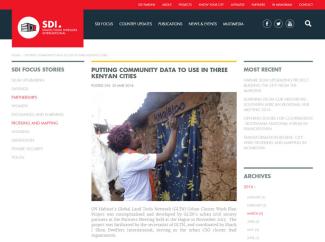Social inclusion
Knowledge is power

It is tempting to see technology as the answer to every problem. But thorough analysis shows that this is not so. Some 863 million people live in informal settlements called “slums”. They lack secure tenure and access to basic services. It will be difficult to ensure that adequate infrastructure is built for them. Lack of knowledge is one problem, and another is that some people benefit from the status quo, making money from the vulnerabilities of others. Transforming cities in way that all citizens get the basic services and safe homes they deserve will have to involve redistribution. It will not happen unless there is political resolve.
To challenge vested interests, people from informal settlements need information. Grass-roots organisations have been working on systematically gathering relevant data. They are affiliates of SDI and based in 33 different countries.
The SDI affiliates have agreed on a standardised method to collect information. By the end of March 2016, they had completed profiles of 4,200 informal settlements. The profiles are based on a 13-page questionnaire that local residents filled in with the support of community activists. The result is a precise snapshot of a settlement’s current conditions, its history and its community life. While technology in itself is not the answer, it does have a role to play. Residents have been trained the use of digital GPS devices – the letters stand for “Global Positioning System”. With GPS they could document the facilities that exist in their neighbourhood and where they are located.
In more than 100 cities, over 85 % of informal settlements have been profiled this way so far. Accordingly, it is now possible to accurately assess the living conditions city-wide.
The data is owned by the local communities and empowers them. It is fine when an academic argues that an urban master plan only indicates “open space” where an informal settlement is located or includes other kinds of “black holes”. The impact is much more powerful, however, when the community concerned provides precise data on the number of residents, the length of their residency and the ways in which they contribute to the prosperity of the city. Such data makes it much harder for local authorities to keep neglecting their community.
Jockin Arputham, the SDI president, says: “Surveys help to empower all slum communities to organise and find out more about their settlement and ward, but they must take the responsibility to strengthen their negotiating ability themselves.” It is not a technical exercise that can be left to an NGO from outside, the grassroots activist from Mumbai insists.
In the experience of SDI affiliates, community-led data collection is very useful in terms of mobilising and organising a community. The process draws people together, enables them to identify their needs and contributes to defining priorities. It helps people to understand their histories, strengthen their identities and rediscover a collective sense of purpose.
Communities have long seen professionals come in, collect data, and disappear without addressing their development needs. SDI’s data revolution is different – it begins at home. The network seeks to be the “go to” place for data about informal settlements.
According to Sheela Patel, who chairs the SDI Board, the approach of building “a global platform for community-gathered data on slums” is being taken very seriously in many countries today. “For us,” she says, “enumeration has always been central”, but officialdom rarely showed interest. That has changed.
For development agencies around the world, the SDI methodology offers a chance to work in partnership with the residents of informal settlements. This is, indeed, a chance to build cities where every one is welcome.
Diana Mitlin is a principal researcher at the International Institute for Environment and Development in London. She specialises in human settlements.
diana.mitlin@iied.org
Links
Arputham, J., 2016: Why we do slum profiles. IIED blog:
http://www.iied.org/why-we-do-slum-profiles
Beukes, A., 2015: Making the invisible visible – Generating data on ‘slums’ at local, city and global scales. IIED Working Paper, London: IIED.
http://pubs.iied.org/pdfs/10757IIED.pdf












